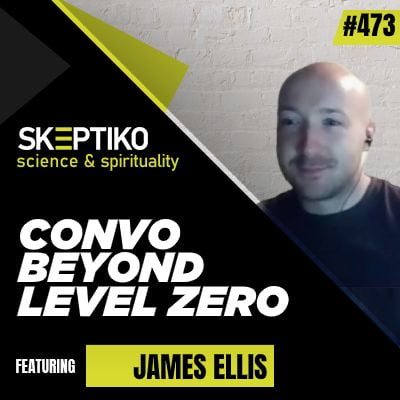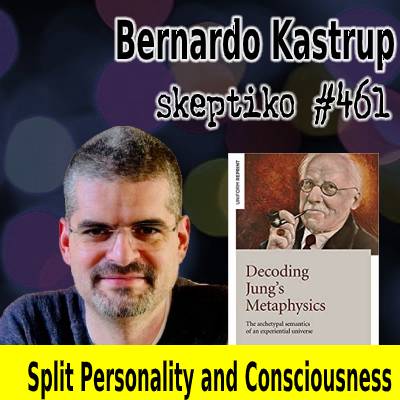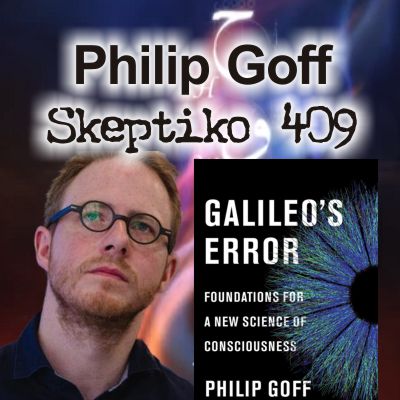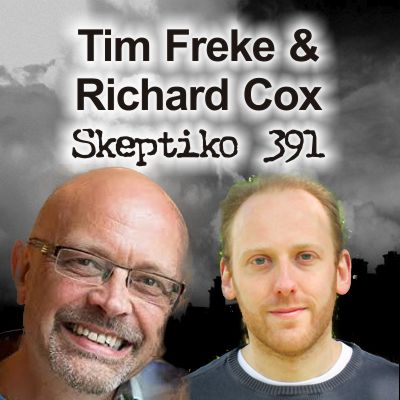Timothy Owen Desmond... Psychic equals singularity... AI Constitutional Convention forum: Here is a summary of...
Tag: philosophy
James Ellis, Raising the Conversation Past Level Zero |473|
James Ellis is a philosopher and creator of the Hermitix podcast where level three conversations are routine. Forgive the longer than...
Conner Habib, Why You Can’t Just Take the Good and Leave the Bad |467|
Conner Habib, seeks to untangle the good from the bad in order to find what makes us human. photo by: Skeptiko That's a...
Dr. Bernardo Kastrup, What Split Personality Tells Us About Consciousness |461|
Dr. Bernardo Kastrup, opens up about extended consciousness, dissociative identity, and angels and demons. photo by:...
Dr. Philip Goff, Will Academia Get Beyond Materialism? |409|
Dr. Philip Goff is a philosophy professor who dares to challenge biological-robot-meaningless-universe party line. photo by:...
Tim Freke & Richard Cox, UFOs, 9-11, Climate And Truth |391|
Tim Freke and Richard Cox join me for a freewheeling talk about stuff they usually don't discuss. photo by: Skeptiko Alex Tsakiris: Today we...
This philosopher goes toe-to-toe with materialist science… so far he’s undefeated |274|
Dr. Bernardo Kastrup has a new take on who we are... and his conclusions don't still sit well with mainstream science types. The links between...
The internet is doing something no one expected — increasing spiritual enlightenment |266|
After 20 years as a meditation teacher Rick Archer turned to podcasting to bring 100s spiritual teachers to the public. You might meet your guru...
248. Bernardo Kastrup Says Materialism is Baloney
Interview with philosopher and author, Bernardo Kastrup examines the limits of scientific materialism. Join Skeptiko host Alex Tsakiris for...
240. Dr. David Lane Not Sandbagged — Patricia Churchland Part 2
https://www.youtube.com/watch?v=VtHzDMwQ9fw Click here for YouTube version Click here for forum discussion Interview with Dr. David Lane...
237. Dr. Patricia Churchland Sandbagged by Near-Death Experience Questions
Click here for YouTube version Click here for forum discussion Interview with neurophilosophy expert Dr. Patricia Churchland reveals a lack of understanding of near-death experience science. Join Skeptiko host Alex Tsakiris for an interview with University of California, San Diego philosophy professor Dr. Patricia Churchland. During the interview Dr. Churchland seems flustered over questions about near-death experience science: Alex Tsakiris: Yeah, but I think we also have problems with the idea that consciousness is an emergent property of the brain thing? I interviewed Christof Koch from Cal Tech last year and he’s the guy who I sent people down this direction that we can no longer claim that consciousness is a product of the brain and we have to move towards this middle position where as he says, consciousness is ontologically distinct, but never really defining how consciousness begins, how consciousness ends, or exactly what the relationship is with the brain. I think a lot of people are more comfortable with Daniel Dennett and Richard Dawkins’ okay, consciousness is an illusion than they are with this middle ground. I don’t really know how that answers the big questions of what the nature of consciousness is other than just to repeat that consciousness is something that the brain does. That doesn’t tell us much. How does it begin? When does it end? What’s necessary and sufficient to cause consciousness? These are all questions that are unanswered by what you’re saying. Dr. Patricia Churchland: Well, neuroscience hasn’t got all the answers yet. Alex Tsakiris: But that’s just passing the buck. We don’t have the answers. Those are fundamental questions. If we don’t have the answers then we don’t have a theory of what consciousness is, right? Dr. Patricia Churchland: That’s what your view seems to be, all right. Alex Tsakiris: I’m just saying these are basic. When does consciousness begin? When does it end? What is necessary and sufficient to create consciousness? If we can’t answer those then what do we really have? What can we really say about consciousness? Dr. Patricia Churchland: Well, I guess we can’t say anything. Alex Tsakiris: Okay. I think we can say some things. Let me ask you this—I didn’t mean to throw you completely off. Do you want to get back to talking about your book? Dr. Patricia Churchland: No, not really. Alex Tsakiris: Okay. What do you think about near-death experience? You write quite a bit about that in your book and what is your general take on near-death experience? Dr. Patricia Churchland: Well, I’m not sure that it really matters, does it? What does it matter for? Alex Tsakiris: I think a lot of folks look at near-death experience as highly suggestive of consciousness somehow, in some way we don’t understand, surviving biological death, which would certainly falsify that other idea that it’s so tied to the brain and that consciousness ends at death. I mean, that would falsify that, right? Dr. Patricia Churchland: Oh, I’m sorry. My dog just came in. No, no, don’t do that. No, no, no, no. Forgive me, I’m sorry. Okay. So yeah, okay, I guess I’ve never have actually had a near-death experience. Have you? Alex Tsakiris: No. Dr. Patricia Churchland: Oh, okay. Alex Tsakiris: But you write quite a bit about it in your book. Dr. Patricia Churchland: So why do you want me to talk about it? Alex Tsakiris: Well, I guess one of the things I did want to ask you is in your book you ask the question, “Is there a neurobiological explanation for near-death experience?” Then you cite NDE researcher and a former guest on this show as answering that question with yes. You say that Dr. Pim Van Lommel believes the answer is yes. Is that your understanding of his research? Dr. Patricia Churchland: Well, I think there’s certainly quite a bit of evidence that at least some near-death experiences have a neurobiological basis. Of course, we can’t be sure about all of them. Maybe you had one that doesn’t have a neurobiological basis. I wouldn’t really know, would I? Alex Tsakiris: Well specifically, Dr. Churchland, you cite in your book that Dr. Pim Van Lommel holds that opinion. That’s clearly not the case. I mean, he’s written… Dr. Patricia Churchland: Has he? Uh-huh (Yes). Alex Tsakiris: Right. Do you want me to read to you what he’s written? He’s written that “The study of patients with near-death experience (and this is from The Lancet paper that you’re citing) clearly shows us that…” Patricia Churchland's Website Listen Now: Download MP3 (25 min.) Read It Welcome to Skeptiko, where we explore controversial science with leading researchers, thinkers, and their critics. I’m your host, Alex Tsakiris, and for this episode of Skeptiko I almost feel like I need to issue one of those warnings that they put on the front of shows that have content that might be inappropriate for some viewers. You know, I’m always surprised when people are squeamish over confrontation, conflict, or debate of any sort. I get that on one level. We don’t want to see people squirm and we want everyone to be nice to each other and all that. I get that. But on another level, I want you to consider that in this interview with Dr. Patricia Churchland, who I’ve really been trying to contact for years. I have emails going back several years in which I tried to contact this woman. She is a well-respected academic, Oxford educated, also UCSD which is a prestigious university out here in California, highly regarded at conferences, gives speeches, and has blabbed about these ridiculous ideas about consciousness that she has.
...221. Atheist John Loftus Explains Why He’s a Biological Robot
Click here for YouTube version Click here for forum discussion Click here to post comments on AlexTsakiris.com Interview with atheist and Christian debunker John Loftus examines the philosophy of atheism. Alex Tsakiris: When we falsify this idea that you are a “biological robot”, and accept that’s absurd, and once we get past the idea that consciousness ends at death, which again, that’s where the evidence points, then a lot of things start falling differently in terms of how I orient myself to the world, how I orient myself to other people, how I orient myself to morals, purpose, meaning in life. You are not a biological robot, John. John Loftus: Okay. I disagree. I’ve said why. Alex Tsakiris: You say, “I am a biological robot. I am going to stand by that.” Right? That’s what you’re saying? John Loftus: Well, there’s no evidence for invisible beings, right? Entities. Alex Tsakiris: But you, as you live your life, you live your life like a biological robot? John Loftus: Everybody does. That’s all there is. Alex Tsakiris: Okay. John Loftus: Well, you have to look into the philosophical quandaries with trying to distinguish between mind and body. I mean, I taught the Introduction to Philosophy classes that you would probably be interested in looking at how they’ve tried to relate the mind and the body. They just really can’t do it. It’s really ludicrous to see how they do that. (interview transcript continued below) John Loftus - Debunking Christianity UPDATE: Follow-up Email Exchange (click here) Play It Listen Now: Download MP3 (64 min.) Read It: Welcome to Skeptiko, where we explore controversial science with leading researchers, thinkers, and their critics. I’m your host, Alex Tsakiris, and this episode of Skeptiko is yet another in this series I’ve been doing on Atheism. Now I do feel a need to tell you a little bit about how I came to do this interview because, as you know if you’ve listened, you just heard a similar kind of debate with philosophy professor Dr. Stephen Law. Actually, these two interviews with Dr. Law and John Loftus came about as the result of my interview on Episode 217 with Gary Marcus, because Gary Marcus is this NYU professor of psychology, bestselling author, writes frequently on consciousness issues, yet if you listen to the interview you’ll hear how he stumbled with some basic questions about consciousness.
...219. Dr. Stephen Law On How Science Handles Extraordinary Claims
Interview with philosopher and noted atheist Dr. Stephen Law examines the philosophy of science and extraordinary claims. Join Skeptiko host Alex Tsakiris for an interview with Dr. Stephen Law author of, Believing Bullshit: How Not to Get Sucked into an Intellectual Black Hole. During the interview Law talks about how science measures extraordinary claims: Alex Tsakiris: This idea of extraordinary claims requiring extraordinary proof, you want to talk about sweeping mystery, sweeping evidence that you don’t like under the rug, here is the mantra for the Centre for Inquiry crowd. I see that as an intellectually feeble pronouncement -- extraordinary claims require extraordinary proof—that is anti-science, isn’t it? Dr. Stephen Law: Why do you think that? Alex Tsakiris: We’ve built this whole institution of science, the whole process of peer-review, the whole process of self-correction around this idea that we will altogether discover what is real, what is not real, what is extraordinary, what is not extraordinary. So the idea that after the fact, after the results come in, we say, “You know, those are pretty interesting results but I deem that to be extraordinary; therefore, you’ll need an extra level of proof on that.” I think it’s just silly. Dr. Stephen Law: Okay, I think I see where you’re coming from. The way I’ve understood that principle, extraordinary claims require extraordinary evidence, says that suppose I tell you that over there, I’ve got a mobile phone and a cup, okay, and I do this, there’s the mobile phone and the cup. You’re going to go, “Hey, yeah, that’s good enough for me.” Steve’s got a mobile phone and a cup. If I now wield out a fairy which I make dance on the end of my finger and go, “There you go, a fairy on the end of my finger,” you’re going to go, “Yeah, Steve’s got a fairy on the end of his finger. Fair enough. I’ll accept that on the basis of the same kind of evidence that I accepted he’s got a cup with a mobile phone.” I bet you would not. Alex Tsakiris: Sure, but we’re talking about science here. We’re talking about peer-review. The example I sent you and I have personal experience with, because he told it to me on this show, is British psychologist and parapsychology critic, Richard Wiseman. He has investigated probably more of these paranormal parapsychology claims, like telepathy, than anybody else. Here’s his quote: “I agree that by the standards of any other area of science that remote viewing (and he later added in this quote, ESP) is proven. But that begs the question: do we need higher standards of evidence when we study the paranormal?” So Stephen, this is not a fairy in the cup. This is a guy who has reviewed hundreds of peer-reviewed papers and is saying, You know what? It’s good enough for any other field of science but not good enough here because of the ground-breaking upset it would make for science. This is the best evidence I could give you for my claim about scientific materialism being woven into science as we know it. Dr. Stephen Law: I think if I stick my finger out there and it appears to be a finger with a fairy spinning around on the end of it, you’re going to be very, very suspicious. You’re not just going to say, “Yeah, Stephen’s proved to me that there are fairies.” You’re going to require much more investigation before you take my word for it that there really is a fairy spinning around on the end of my finger. Why is that? It’s because the prior probability of anything like a fairy exists is very, very low indeed, knowing what we do. (continued below) Dr. Stehpen Law's Blog Click here for YouTube version Click here for forum discussion Play It Listen Now: Download MP3 (64 min.) Read It: Alex Tsakiris: Let me, in that spirit, return to your book, Believing Bullshit, with another quote that I liked: “The more we appeal to mystery to get ourselves out of intellectual trouble, the more we use it as a carpet under which to sweep inconvenient truths or discoveries, the more vulnerable we become to deceit. Deceit by both others and by ourselves.” Let me juxtapose the quote from your book with a quote from biologist Rupert Sheldrake, author of The Science Delusion, one of these folks out there among many, many that I’ve spoken with and are out there who can see this scientific materialism and the position of folks like Richard Dawkins as a major impediment to really moving forward and answering some of these big questions. Here’s what Sheldrake says: “For more than 200 years, materialists have promised that science will eventually explain everything in terms of physics and chemistry. These believers are sustained by the faith that scientific discoveries will justify their beliefs.”
...196. Rupert Sheldrake, Terrance McKenna and Ralph Abraham — A Dialog That Still Matters
A look back at a series of dialogs between Rupert Sheldrake, Terrance McKenna and Ralph Abraham. Join Skeptiko host Alex Tsakiris for a...
176. Dr. Jeffrey Kripal On Science Fiction As a Trojan Horse For the Paranormal
Interview with author and Professor of Religious Studies examines how paranormal experiences have fueled the work of famous science fiction and comic book authors. Join Skeptiko host Alex Tsakiris for an interview with Rice University Professor of Philosophy and Religious Thought, and author of, Mutants and Mystics: Science Fiction, Superhero Comics, and the Paranormal, Dr. Jeffrey Kripal. During the interview Kripal discusses how science and culture affect our worldview: Alex Tsakiris: It’s also interesting how you used the term “Trojan Horse” because one of the themes of the book is this indictment against science as we know it. Science that insists not only that the paranormal doesn’t exist, but that it’s impossible. Dr. Jeff Kripal: Basically what I’m trying to get out there is that the thoughts we think and the worldviews we inhabit are determined by our cultures. The reigning culture is this scientific materialism that essentially argues that we’re only matter and that we can never get outside of our bodies and the particular historical context in which we find ourselves. What happens to human beings all the time is that they have these sorts of extraordinary experiences that do seem to take them outside of their context, outside their bodies, even outside of space and time which is how my artists and authors talk about it today. So I’m simply pointing out that those sorts of experiences are dismissed or ignored because there’s no way to fit them into the reigning paradigm. But once we just open up the paradigm, then they make actually a good deal of sense. They actually become really interesting and powerful experiences to take into consideration. You can’t think yourself out of a box with the terms of the box. You have to find some other way to get out of the box. Alex Tsakiris: Right, but the paradox is that that’s what we’re required to do. I mean, we’re reading this book in this here-and-now-reality and yet we’re exploring this very different reality. Maybe you want to expound on this idea of “human as two” that recurs in your writing. Dr. Jeff Kripal: The book came out of a series of interviews and readings of artists and authors who create these forms of popular culture. A lot of them are very clear that when they have these paranormal experiences they were not in their normal sense of self or their normal psyches. The experience is essentially one of being split in two where part of the human being is outside of space and time and part of the human being is in space and time. Dr. Jeffrey Kripal's Website Play It: Download MP3 (62 min.) Read It: Alex Tsakiris: Today we welcome back Dr. Jeff Kripal to Skeptiko. Jeff holds a chair in Philosophy and Comparative Religion at Rice University in Houston. He was a very popular guest when he joined me last year to talk about his excellent book, Authors of the Impossible. He’s back today to talk about his latest, Mutants and Mystics: Science Fiction, Superhero Comics, and the Paranormal. Jeff, thanks for joining me. Welcome back. Dr. Jeff Kripal: Thanks for having me back again.
...156. Closer to Truth Host, Dr. Robert Kuhn, Skeptical of Near-Death Experience Science
Interview with Dr. Robert Kuhn reveals why he’s reluctant to accept evidence for near-death experience (NDE) science. Join Skeptiko host Alex Tsakiris for an interview with Dr. Robert Kuhn, host of popular television show Closer to Truth. During the interview Kuhn discusses the evidence for survival of consciousness after death: Alex Tsakiris: Let’s talk about survival of consciousness a little bit -- life after death -- and in particular near-death experience research. It’s a topic we’ve covered a lot on this show. If there’s consciousness with no brain, then the mind/body debate is really over. Why isn’t this an area you’ve dug into? Dr. Robert Kuhn: That’s a legitimate question and obviously we’ve touched on it because we do deal with life after death in terms of the religious expressions of it. So that’s something I can focus on, because it’s not a question of physical fact as NDE would be, which I am very skeptical of. Alex Tsakiris: Who would be someone you would point to as being an NDE skeptic? Dr. Robert Kuhn: To me, the number of people would be legion. The burden of proof is on the other side. Alex Tsakiris: The burden of proof of what? The NDE evidence is pretty clear. For example when they’ve studied this in the cardiac ward they know there’s no brain electrical activity and yet there’s this conscious NDE experience. I mean, that’s really the crux of the mind/body issue. Dr. Robert Kuhn: I would find that not compelling at all if that’s the evidence. Alex Tsakiris: What do you mean? Dr. Robert Kuhn: I personally believe that there is more likely than not a need for something beyond the material world as we understand it today to explain consciousness and mind. I would not, though, use as evidence for that the existence of the NDE. Closer to Truth Website Play It: Download MP3 (41:00 min.) Read It: Alex Tsakiris: Let’s talk about survival a little bit. Life after death. It’s a topic we’ve covered a lot on this show because the evidence for it really cuts to the core of this argument we’ve just been talking about. If there’s consciousness when there’s no brain, then it’s really debate over. And that, of course, brings… Dr. Robert Kuhn: Well, I don’t necessarily agree with that but to be very rigorous in the analysis it does not follow that if there is more to consciousness than the brain, it does not follow that there has to be a guaranteed life after death. It can follow; it is not excluded, of course. It is a fact in that direction…
...145. Stanley Krippner Lends Scientific Weight to Paranormal Dreams
Professor of Psychology and well-respected researcher Dr. Stanley Krippner explains how his research supports the reality of precognitive dreams. Join Skeptiko guest host and paranormal dream expert Andy Paquette for an interview with legendary psychology researcher Dr. Stanley Krippner.. During the interview Dr. Krippner discusses whether or not the evidence for paranormal dreaming is well established: Andy Paquette: You’ve been studying dreams for the most part for the majority of your career. Do you feel that the case for precognitive dreaming is proven? Dr. Stanley Krippner: No, I don’t think anything in science is proven. Science is always open-ended. There’s always a chance of revising scientific theory based on new data. Andy Paquette: Of course, that would work both ways, as well, wouldn’t it? So what you’d really be talking about is what does the currently available information indicate? Dr. Stanley Krippner: That’s right. Andy Paquette: And in your case, from what you’ve seen, what do you think the currently available information indicates? Dr. Stanley Krippner: I think you can make a strong case for precognitive dreams. Stanley Krippner's Website Play it: Download MP3 (35:00 min.) Read it: Alex Tsakiris: Today we’re joined by Andy Paquette, who is a former Skeptiko guest and is also the author of Dreamer: 20 Years of Psychic Dreams and How They Changed My Life. Now, Andy is joining us today because he recently attended the 2011 Study of Dreams Conference in The Netherlands, where he was also a presenter. While he was there he was nice enough to snag a couple of interviews for us and he’s here to share them with us. So Andy, welcome and tell us what you’ve been up to.
...115. Dr. Jeff Kripal Offers a Fresh Perspective on the Nature of Consciousness
Comparative Religions scholar and author of, Authors of the Impossible explores the link between consciousness and culture. Join Skeptiko host Alex Tsakiris for and interview with Rice University Religious Studies professor and author of, Authors of the Impossible, Dr. Jeff Kripal. During the interview Dr. Kripal discusses how a broad view of comparative religions might inform scientific debate on the nature of consciousness, "I have developed this model of consciousness and culture… I'm sure some people will read that it's always just culture. Other people will read it as saying I believe in some kind of absolute consciousness beyond our culture… but actually it's both. I'm trying to maintain this both/and thinking and not keep falling into this either/or." Dr. Kripal also discusses how this model might change our view of near-death experience science, "I'm not suggesting that near-death experiences are simply culture or nothing but local context. Not at all. I think consciousness is self-existent and does survive bodily death, but I also think it always, always, always expresses itself… through language and culture and context. So you're never outside of that. But you may be outside of it when you die. I mean, I don't know. If I've died before I don't remember it." Dr. Kripal also share his thoughts on how a new model of consciousness might impact religion, "I'm thinking more of creating a new religious worldview. Not me, personally, mind you, but as a culture. That's where the historian can speak here, too. When religious systems start out, nobody knows where they're going. They never, ever, ever come out of nowhere. They're always syntheses or fusions of the scientific knowledge of the time and the different cultures that are interacting. So where I place my hope isn't on Church A or Synagogue B or Scientist X. It's the future generations who can put this stuff together in a completely new way, which I think is almost inevitable." Check out Dr. Jeff Kripal's website Authors of The Impossible Podcast: Dean Radin Interview Play it: Download MP3 (61:00 min.) Read it: Alex Tsakiris: Today we're joined by the author of Authors of the Impossible: The Paranormal and the Sacred, a book that he's also developing into a documentary film, as well as a podcast titled, Impossible Talk. As an aside, I have to mention what a fine podcast it is. The interviews are just fantastic and Jeff brings this dialogue-between-colleagues style that's really enjoyable and quite insightful. He's also the head of the Department of Religious Studies at Rice University and is the author of several other interesting books I hope we have a chance to talk about. Dr. Jeff Kripal, thanks for joining me today on Skeptiko.
...15. Your Mind is More Than Your Brain, Dr. Robert Almeder
Guest: Dr. Robert Almeder, reviews his work on the epistemology of science, and criticism of materialism as a way of explaining the relationship...




















